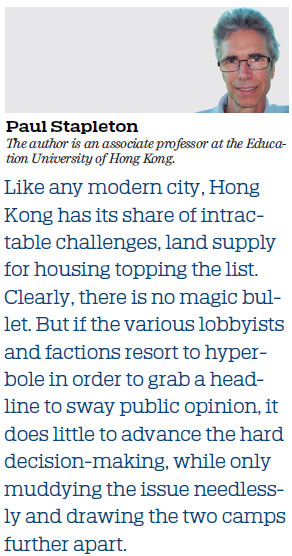Have rational talks and avoid hyperbole to solve land issues
Updated: 2019-01-07 07:22
By Paul Stapleton(HK Edition)
|
|||||||
Paul Stapleton says that when trying to resolve key issues like land supply in HK, solutions will only be found after sensible discussion and a degree of compromise
The long-awaited report from the Task Force on Land Supply has finally been released with eight preferred options for development based on choices from the public. Unsurprisingly, the Hong Kong Golf Club at Fanling, or at least a chunk of the course, has been recommended for housing redevelopment. The lack of surprise may be due to its occupying a prime piece of real estate close to a rail line in Fanling without any need to reclaim land from the sea, build the associated infrastructure or fight with the powerful vested interests associated with brownfield sites.
Of course, another reason that the golf course is on the list is symbolic. Golf is a rich person's sport with one round costing in excess of HK$1,000. Surely when some members of the public ranked the golf course high on their list of choices for development, the symbolic aspect played a role. It's hard to quantify how much of a factor our notorious wealth gap played in the public sector's desire to bring the wealthy down a notch or two. After all, when tens of thousands of grassroots families are crammed into tiny subdivided flats, there is a perception that even the wealthy should have to sacrifice a little.
With this backdrop, Kenneth Lau Ka-lok, a spokesperson for the Hong Kong Alliance of Golfers, claimed Hong Kong would lose its status as an international banking center if the course were redeveloped. And further, he claimed: "There are more than a dozen golf courses in Long Island because New York is an international financial center. Bankers and analysts seem to love golfing. They often discuss business during a four-hour session. Some banks even interview jobseekers over golf."

Let's examine the logic of that statement. We learn that because one suburb in New York City has a dozen golf courses, and because some bankers and analysts make deals during their rounds of golf, golf courses, ipso facto, are essential not only for doing business, but also for sustaining a city's status as a financial hub. Somehow, Lau has failed to consider that only a few precious holes of the course in Fanling among the present 36 would be redeveloped. And secondly that there are plenty of other golf courses here in Hong Kong.
Despite this egregious lack of logic which casually couples correlation with causation, that is, golf courses create financial centers, Lau actually scored a hole-in-one with his comment. The following day, the local papers dutifully put it in their headlines, and at least for some readers, it may have scored some points.
But a larger, more insidious element is at play here related to the way information is conveyed and positions argued in an era of extremism and fake news. Taking a page from US President Donald Trump's hyperbole, it appears that advocates of any position these days must exaggerate their claims beyond all logic in order to capture a headline and their audience's attention. In the meantime, civilized discourse disappears and any middle ground, which is where the logical arguments lie, evaporates.
The problem with this polarized way of discussing ways forward on challenging issues such as Hong Kong's shortage of land for housing is that it entrenches the two sides and makes reasonable debate and compromise impossible and all the supporting evidence from either side becomes suspect.
For example, the Hong Kong Golf Association makes the claim that there are 100,000 local golfers, but because we live in a world of hyperbole, the number immediately comes under suspicion. Perhaps this definition of a local golfer is someone who has played golf at least once in their lifetime. Likewise, advocates for flats on fairways in the opposing camp can exaggerate the number of households that can be accommodated. And then the argument devolves into a debate over imaginary competing statistics.
Like any modern city, Hong Kong has its share of intractable challenges, land supply for housing topping the list. Clearly, there is no magic bullet. But if the various lobbyists and factions resort to hyperbole in order to grab a headline to sway public opinion, it does little to advance the hard decision-making, while only muddying the issue needlessly and drawing the two camps further apart. Nonsense like Lau's claim that Hong Kong will lose its status as a financial center when a few fairways are ploughed under tempts the opposing side into equally absurd claims.
In the end, solutions can only be found through reasoned debate and compromise. Hyperbole gets us nowhere.
(HK Edition 01/07/2019 page8)